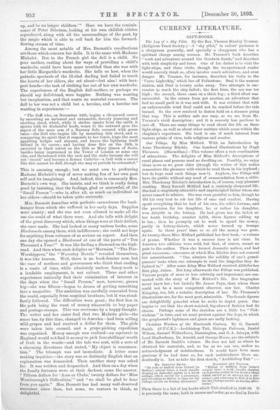Our Village. By Miss Mitford. With an Introduotion by Anne
Thackeray Ritchie. One hundred illustrations by Hugh Thomson. (Macmillan.)—This volume offers a rare combination of attractions. The delights of Miss Mitford's descriptions of rural places and persons need no dwelling on. Possibly, we enjoy them more as we grow older (though the 'writer of this notice remembers the pleasure with which he read them in his boyhood ; but do boys read such things now ?). Anyhow, Our Village will have its public without any need of commendation from a critic. Mrs. Thackeray Ritchie's introduction is, of course, very pleasant reading. Mary Russell Mitford had a curiously chequered life. She had a singularly attractive and unprincipled father whom she never ceased to admire. She was oven grateful to him, though he did his very best to rob her life of ease and comfort. Having spent everything that he had of his own, his wife's fortune, and the provision for his daughter, he, or rather his daughter, won £20,000 in the lottery. He had given her the ticket on her tenth birthday, number 2,224, these figures adding up to ten ; then he promptly set to work to spend the money, partly in lottery-tickets, which never turned up trumps again. In three years' time or so all the money was gone. At twenty-three Miss Mitford published her first book,—a volume of poems. Whether it was a success here is not clear. In America two editions were sold, but that, of course, meant no gain to the author. Then she turned dramatic author, and had great successes,—successes at which Mrs. Ritchie does not conceal her astonishment. " One admires the solidity of one's grand- parents' taste when one attempts to road the tragedies they de- lighted in." After some delay Miss Mitford received £200 for her first play, Julian. Not long afterwards Our Village was published. Various people of more or less celebrity and importance are con- nected with the story of Miss Mitford's life. Her biographer never knew her ; but luckily Mr. James Payn, than whom there could not be a more competent observer, saw her. Charles Kingsley, too, left a notable description of her. Mr. Thomson's illustrations are, for the most part, admirable. The female figures are delightfully graceful when he seeks to depict grace. One begins to see that the short-waisted, big-sleeved fashion had its charm. Perhaps some of the sketches are a little too " Pick- wickian " in tone, and we must protest against the dogs, in which the greyhound's lightness and grace are sadly lacking.


































 Previous page
Previous page